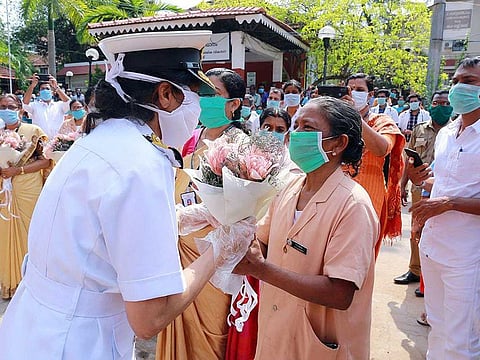COVID-19: A challenge and opportunity for Kerala as half a million return
Policy makers will need to ensure that expats can utilise skills to help change the state

Thiruvananthapuram: The Kerala government’s offer to bring back expatriates wanting to come home has evoked a humongous response, with over half a million applicants on the portal of the Non-resident Keralites’ Affairs (Norka) department.
While the Indian government is making plans to bring them, and other Indians, back by air as well as by military ships, Kerala is grappling with the implications of the return of such a large number of expatriates.
Teary homecoming
Homecoming should normally provide an emotional high for expats and their families, but this time the return home is tinged with sadness. No society has been affected as severely by the coronavirus epidemic as Kerala’s for the reason that Keralites are based around the world.
Norka’s data shows that there are over half a million Kerala expats from 201 nations who are returning, and more than 50,000 are returning after having lost jobs.
It is ironic that this is the week that marks the International Labour Day, but the coronavirus hasn’t spared anyone while destroying jobs – not even Keralites who are known to be highly aware of labour rights.
A history of migration
Stories of migration have dotted Kerala’s recent history. During the days after the Second World War, many Keralites travelled to work on the military’s road projects in the north-eastern Indian state of Assam, braving death from malaria.
Since then, there have been spurts of migration to Singapore and Malaysia and then a major wave of migration to the Gulf. Kerala’s nurses went to Germany, its teachers went to East African countries, and later generations pushed into western Europe, the US and Canada.
Reverse flows have been rare. One occasion was during the Kuwait war in 1990 and another occasion was during the global financial crisis in 2008. On both occasions, the expats returning were mostly from the Gulf region.
This time is different because the returns are from around the world, many have lost their jobs and the numbers are staggering.
A flair for care-based sectors
Historian Dr P.K. Michael Tharakan feels that Keralites’ natural trait of “care” easily lends them to excel in care-based professions like nursing, teaching and even banking. “The very fact that they got jobs abroad points to the fact that people around them like friends and family, relatives and contacts had concern for them and helped them reach there”, Tharakan told Gulf News.
But whether Kerala can rebuild lives based on nursing-teaching-banking professions alone remains to be seen. “That depends a lot on how the world rebuilds itself,” says Tharakan.
He says historically Keralites have lived in social harmony. Over many centuries, Kerala’s Hindus engaged in paddy farming, Christians traded and Muslims and Jains engaged in inter-province or inter-kingdom long-distance trading. These communities were inter-dependent and therefore preserved their social harmony. Such unity will be a matter of strength in these trying times.
Attitude matters
Technocrat G. Vijayaraghavan says returning expats can rebuild their lives right here “provided they have a willingness to work and the right attitude”. He points out that a good number of expats remit not more than Rs 10,000-Rs 15,000 each month, which is what workers in Kerala like coconut climbers can also save.
On the technology front he does not expect significant gain for Kerala from the returning expatriates because companies are going to retain the top talent and not let them go.
A remittance economy
There are fears that Kerala’s economy will take a serious hit because remittances have traditionally propped up the state’s economy. “It was the Gulf migration that supported the state’s economy during the difficult days of the 1970s,” economist and director of the Gulati Institute of Finance and Taxation, Dr K.J. Joseph told Gulf News.
Large scale migration had lasting effects on Kerala’s socio-economic fabric. On one hand, palatial houses dotted the Kerala landscape. On the other, when electricians, plumbers and other technicians left, it created a shortage of skilled workers and pushed up the wages in the state. This, in turn, dented the competitive edge of Kerala’s commodity exports as the state became a high labour cost economy.
Challenge and opportunity
Kerala’s immediate future will depend on how the situation is handled. The returning expats come armed with international exposure and significant up-skilling. They are returning ever more intelligent, imaginative and ready for any challenge.
The five million who are returning are those who have proven themselves in international markets and been remitting a trillion rupees annually. No one can underestimate their capabilities.
A point to ponder
One question that hangs heavily is why the expats had to leave their state and country in the first place. If it was the lack of an enabling environment, that has to be corrected with immediate effect.
The state cannot afford to lose the contribution of its expat sons and daughters in the most productive age group of 22-60 years who are returning. The policy makers of the state will need to make drastic interventions to ensure that the returning expatriates can utilise their skills to help change Kerala.
Sign up for the Daily Briefing
Get the latest news and updates straight to your inbox



